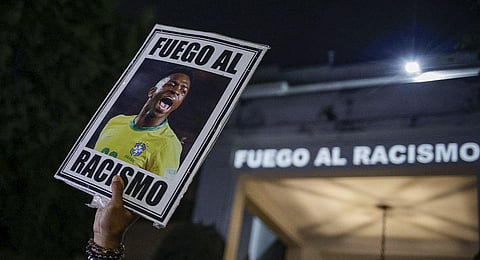

DUESSELDORF (GERMANY): Among the thousands of fans in the stands at Europe's biggest football games are a few people operating undercover. Trained volunteer observers listen for racist chants and watch for extremist symbols on banners.
"You have to be aware of the environment and fit in without standing out. You have to be discreet," one observer, who has worked at games involving some of football's best-known clubs and national teams, told The Associated Press.
The observer, who spoke on condition of anonymity because the job requires it, is part of a program run on behalf of European football's governing body, the Union of European Football Associations (UEFA), by the Fare Network, a prominent anti-discrimination group.
Fare monitors about 120 games per season in Europe's main three men's club competitions, executive director Piara Powar told the AP, and more around the world in national team events like World Cup qualifying.
Evidence from the program, including photos taken surreptitiously from the stands, is used in disciplinary cases against clubs or national teams whose fans display racist behaviour in European competitions like the Champions League.
"It's not a career, but a way to make soccer better for the future," the observer said.
Observers work on a volunteer basis, with expenses covered, and are expected to keep tabs on hardcore fan groups' social media to track where incidents may occur.
Inside the stadium, an observer watches the stands for signs of racist, homophobic, sexist or other discriminatory chants or banners, while also keeping an eye on the action on the field, which shapes what happens among fans.
"If you get a disgruntled fan base and they're getting beaten 5-0 and they get knocked out of a competition that they felt that they were going to progress in, then that could be another catalyst," the observer said. "You have to constantly read the situation as it unfolds."
Observers are expected to be familiar with symbols used by nationalist groups, especially the logos and number codes — like 88 for Heil Hitler, which they use to send surreptitious messages.
Games are given risk ratings to determine how many observers are needed, and up to three observers can work at the highest-risk games.
Sometimes a game rated "medium-risk" can "blow up in your face" unexpectedly, the observer added. That sets off a scramble to document the evidence and send it to a UEFA delegate in the stands — not always easy on overloaded stadium Wi-Fi.
That documentation can then be used by the UEFA disciplinary unit for "further investigation and possible proceedings," the European soccer governing body said in a statement to the AP.
Hooliganism incidents have decreased in European soccer in recent decades, but some fan groups have a reputation for racist behaviour and violence. For security reasons, the identity of the observers at a game is known to as few people as possible.
The observer described feeling "ill at ease" in some situations, but never in personal danger. Observers are not expected to infiltrate close-knit, hardcore fan groups, but to watch from a distance.
"You need to get as close as you can, but be as far away as your safety requires. Fare's work isn't always welcome." the observer said.
In a case at the Court of Arbitration for Sport over a banner at a 2019 game that was judged to contain a coded racist message, Georgian club Dinamo Tbilisi sought to challenge Fare's assessment, arguing that the observer collecting the evidence was "professionally trained to recognize potentially racist symbols and is therefore biased."
The panel rejected the argument and pointed out that even if the banner's message wasn't clear to most fans, it still broke the rules against racist messages.
Like referees, Fare observers can't work at games involving clubs they support. The observer said the goal is to make the atmosphere at games safer and more inclusive in the future.
Over several years of working games, the observer has seen change for the better, but so far only "baby steps."
"It's a professional endeavor. It's not going for the sake of it," the observer said.
"I'm indifferent to the results. When a goal's scored, sometimes I have to stand up to feign excitement, but they are teams that I have zero emotional moments with."